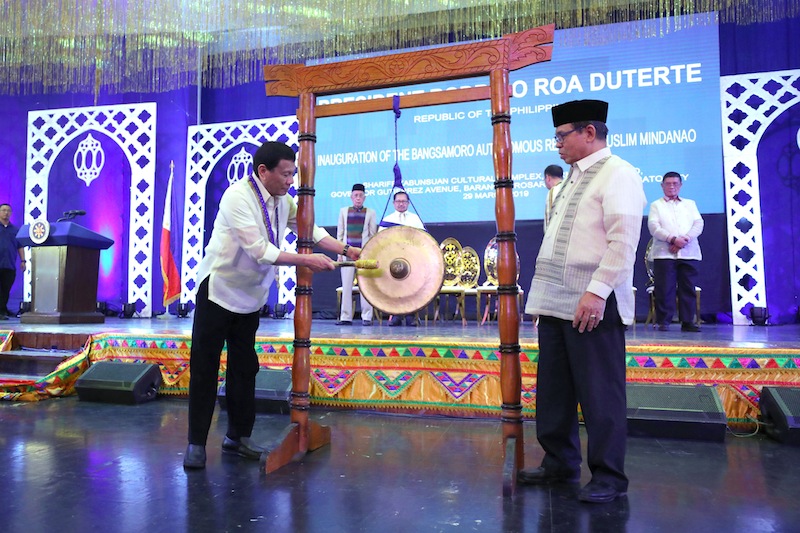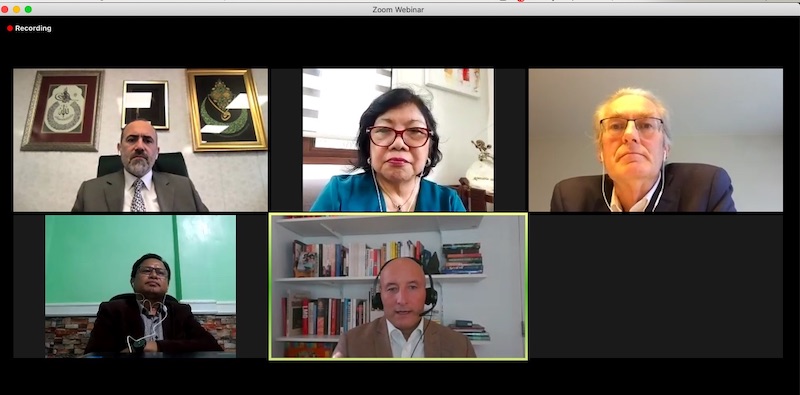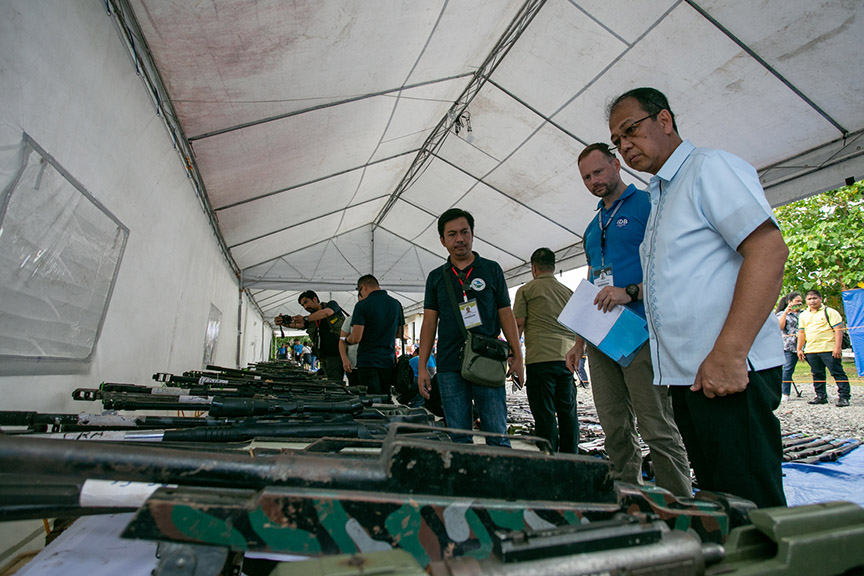From MindaNews (Dec 15, 2020): TPMT: Bangsamoro peace pact implementation “fundamentally on track” but some elements “require more time to complete (By CAROLYN O. ARGUILLAS)
DAVAO CITY (MindaNews / 15 December) – An independent body monitoring the implementation of the peace agreement between the Philippine government (GPH) and the Moro Islamic Liberation Front (MILF) said the peace process is “fundamentally on track” with the establishment of the Bangsamoro Autonomous Region in Muslim Mindanao (BARMM) as a “very big achievement” but noted that some elements “will require more time to complete.”Speaking from Brussels, Third Party Monitoring Team (TPMT) chair Heino Marius, told a virtual press conference on Monday afternoon (in the Philippines) that it is beyond the mandate of the TPMT to recommend an extension of the three-year transition period as that matter has to be decided upon by both parties, but asked if “more time” means “beyond June 30, 2022,” he replied “yes.”

President Rodrigo Roa Duterte sounds the agong to signal the inauguration of the Bangsamoro Autonomous Region in Muslim Mindanao (BARMM) at the Shariff Kabunsuan Cultural Complex in Cotabato City on March 29, 2019. Joining the President is BARMM Interim Chief Minister Al Haj Murad Ebrahim. ROBINSON NIÑAL JR./PRESIDENTIAL PHOTO
Republic Act 11054, the enabling law of the 2014 Comprehensive Agreement on the Bangsamoro (CAB) provides that the end of the transition period is on June 30, 2022 when the first set of officials elected in May 2022, shall have taken their oath of office. At present, the BARMM is governed by the 80-member, MILF-led Bangsamoro Transition Authority (BTA) appointed by President Rodrigo Duterte.
The BTA has called for an extension of the transition period to 2025 and President Rodrigo Duterte support this call, according to Presidential Adviser on the Peace Process Carlito Galvez.
In his opening statement, Marius, a German national who was part of the peace mediation task force of the external service of the European Union, said the issue on extension is not reflected in their report which covers the period from March 2019, when the BARMM was formally inaugurated, to October 2020.
He said they took note of the comments of senior leaders of the GPH and MILF on extension but clarified that “it would exceed the mandate of the TPMT to come up with advice on whether such an extension is justified or not.”
“It is up to the two parties to decide what steps are required to make the transition a success, and if that requires a longer transition then they need to work with Congress in order to secure the necessary amendment of the Bangsamoro Organic Law,” he said.
He said the remaining challenges mentioned in their report “tend to show that the time allocated to the transition period is very tight and the ongoing COVID-19 pandemic has considerably complicated the picture” and as a consequence, “it has become clear that many elements which form part of the peace process,” particularly the normalization track, “will in all likelihood require time beyond May 2022.”
3 House Bills
At least three bills have been filed at the House of Representatives seeking an extension of the transition period by resetting the first regular elections of the Bangsamoro Government from May 2022 to May 2025.
House Bills 8116 and 8117 were filed on December 1 by Antique Rep. Loren Legarda and Maguindanao 2nd district Rep. Esmael Mangudadatu while House Majority Leader Ferdinand Martin Romualdez filed HB 8117 on December 7.
Mangudadatu, chair of the House Special Committee on Peace, Reconciliation and Unity, on Monday said Speaker Lord Allan Velasco has signified he will co-author the three bills. No bill has been filed on the same subject in the Senate as of December 14.
There are only two session days left this year and a total of 41 session days (Mondays to Wednesdays) from December 15 until Congress adjourns sine die on June 4, 2021.
Filing of certificates of candidacy for the May 2022 elections is in October 2021. The Bangsamoro election is supposed to be governed by the Bangsamoro Electoral Code which is still pending in the Parliament.
Mandate
The TPMT report on the period from March 2019 to October 2020 is the 6th public report issued by the body since it was mandated in 2013 by the GPH and MILF to monitor, review and assess the implementation of all their signed agreements.
The TPMT is composed of two nominees from the GPH and two from the MILF (one local and one international each) and a chair jointly nominated. Marius is chair and the other TPMT members are Karen Tañada of the Quezon City-based Gaston Z Ortigas Peace Institute, Rahib Kudto of the Cotabato City-based United Youth for Peace and Development, Sam Chittick of The Asia Foundation and Husseyin Oruc of the IHH Humanitarian Relief Foundation in Turkey.
Republic Act 11054, the enabling law of the 2014 Comprehensive Agreement on the Bangsamoro (CAB) provides that the end of the transition period is on June 30, 2022 when the first set of officials elected in May 2022, shall have taken their oath of office. At present, the BARMM is governed by the 80-member, MILF-led Bangsamoro Transition Authority (BTA) appointed by President Rodrigo Duterte.
The BTA has called for an extension of the transition period to 2025 and President Rodrigo Duterte support this call, according to Presidential Adviser on the Peace Process Carlito Galvez.
In his opening statement, Marius, a German national who was part of the peace mediation task force of the external service of the European Union, said the issue on extension is not reflected in their report which covers the period from March 2019, when the BARMM was formally inaugurated, to October 2020.
He said they took note of the comments of senior leaders of the GPH and MILF on extension but clarified that “it would exceed the mandate of the TPMT to come up with advice on whether such an extension is justified or not.”
“It is up to the two parties to decide what steps are required to make the transition a success, and if that requires a longer transition then they need to work with Congress in order to secure the necessary amendment of the Bangsamoro Organic Law,” he said.
He said the remaining challenges mentioned in their report “tend to show that the time allocated to the transition period is very tight and the ongoing COVID-19 pandemic has considerably complicated the picture” and as a consequence, “it has become clear that many elements which form part of the peace process,” particularly the normalization track, “will in all likelihood require time beyond May 2022.”
3 House Bills
At least three bills have been filed at the House of Representatives seeking an extension of the transition period by resetting the first regular elections of the Bangsamoro Government from May 2022 to May 2025.
House Bills 8116 and 8117 were filed on December 1 by Antique Rep. Loren Legarda and Maguindanao 2nd district Rep. Esmael Mangudadatu while House Majority Leader Ferdinand Martin Romualdez filed HB 8117 on December 7.
Mangudadatu, chair of the House Special Committee on Peace, Reconciliation and Unity, on Monday said Speaker Lord Allan Velasco has signified he will co-author the three bills. No bill has been filed on the same subject in the Senate as of December 14.
There are only two session days left this year and a total of 41 session days (Mondays to Wednesdays) from December 15 until Congress adjourns sine die on June 4, 2021.
Filing of certificates of candidacy for the May 2022 elections is in October 2021. The Bangsamoro election is supposed to be governed by the Bangsamoro Electoral Code which is still pending in the Parliament.
Mandate
The TPMT report on the period from March 2019 to October 2020 is the 6th public report issued by the body since it was mandated in 2013 by the GPH and MILF to monitor, review and assess the implementation of all their signed agreements.
The TPMT is composed of two nominees from the GPH and two from the MILF (one local and one international each) and a chair jointly nominated. Marius is chair and the other TPMT members are Karen Tañada of the Quezon City-based Gaston Z Ortigas Peace Institute, Rahib Kudto of the Cotabato City-based United Youth for Peace and Development, Sam Chittick of The Asia Foundation and Husseyin Oruc of the IHH Humanitarian Relief Foundation in Turkey.

Members of the Third Party Monitoring Team that monitors the implementation of the peace agreement between the Philippine government and the Moro Islamic Liberation Front during the virtual press conference on Monday afternoon, December 14, 2020. (Top, from left) Husseyin Oruc of the IHH Humanitarian Relief Foundation, Karen Tañada of Gaston Z Ortigas Peace Institute, and chair Heino Marius. (Bottom, from left) Rahib Kudto of United Youth for Peace and Development and Sam Chittick of The Asia Foundation.
Marius said the parties to the peace agreement were consulted on the report and were given two weeks to come back with comments but “basically what goes into the report is our responsibility since we operate in an independent capacity,”
Chittick said the TPMT issues public reports but also sends the parties confidential reports.
The TPMT report said that what the parties achieved during the period covered by the report is “all the more significant as it has become clear that the COVID-19 pandemic is placing a heavy burden on the transition” from the Autonomous Region in Muslim Mindanao to the BARMM.
‘More time,’ ‘Behind schedule’
“As a result, some elements of the peace process will require more time to complete than originally anticipated,” the TPMT report said, as it also noted that while the political and normalization tracks of the peace process go hand-in-hand and reinforce each other, it is concerned that “certain aspects to ensure human security in the Bangsamoro under the normalization track are behind schedule.”
It cited the delay in the third round of decommissioning of combatants and weapons of the MILF’s Bangsamoro Islamic Armed Forces, scheduled initially for July 2020, and noted that the parties have yet to clarify the full range of benefits to decommissioned combatants.
Marius said the parties to the peace agreement were consulted on the report and were given two weeks to come back with comments but “basically what goes into the report is our responsibility since we operate in an independent capacity,”
Chittick said the TPMT issues public reports but also sends the parties confidential reports.
The TPMT report said that what the parties achieved during the period covered by the report is “all the more significant as it has become clear that the COVID-19 pandemic is placing a heavy burden on the transition” from the Autonomous Region in Muslim Mindanao to the BARMM.
‘More time,’ ‘Behind schedule’
“As a result, some elements of the peace process will require more time to complete than originally anticipated,” the TPMT report said, as it also noted that while the political and normalization tracks of the peace process go hand-in-hand and reinforce each other, it is concerned that “certain aspects to ensure human security in the Bangsamoro under the normalization track are behind schedule.”
It cited the delay in the third round of decommissioning of combatants and weapons of the MILF’s Bangsamoro Islamic Armed Forces, scheduled initially for July 2020, and noted that the parties have yet to clarify the full range of benefits to decommissioned combatants.

Secretary Carlito Galvez Jr. (right), Presidential Adviser on Peace, Reconcialiation and Unity inspects weapons from the Moro Islamic Liberation Front (MILF) that were decommissioned during the launch of the second phase of the decommissioning process of MILF weapons and combatants in Simuay, Sultan Kudarat on 7 September 2019. MindaNews photo by MANMAN DEJETO
A mid-term review conducted by the peace advocacy group, Mindanao People’s Caucus, said the government offered a million-peso package but only the cash allocation of 100,000 pesos has been given.
The two parties also have to resolve the issue on how to proceed to the next phase of the decommissioning process when the peace agreement specifies this phase will begin with the operationalization of the Bangsamoro Police Force but this regional police provision was not carried into RA 11054, the enabling law of the peace agreement.
Marius acknowledged “there are issues between the two parties, there’s a gap in perspectives” that have yet to be sorted out.
“We understand the two parties are discussing these things together and we hope we arrive at a mutually satisfying solution soon,” he said.
The report also said other elements that require attention “due to slow progress” include the transformation of MILF camps, amnesty for MILF members, redeployment of the Armed Forces of the Philippines, disbandment of Private Armed Groups within BARMM, as well as transitional justice and reconciliation.
IGRB
The TPMT also commended both parties for the momentum they have shown through the Intergovernmental Relations Body (IGRB) headed by Finance Secretary Carlos Dominguez for the government and Education Minister Mohagher Iqbal for the Bangsamoro.
“The TPMT welcomes the momentum in the IGRB, as it is an important role in resolving outstanding issues, and the momentum reflects the determination of both National and BARMM governments to cooperate with each other in a spirit of mutual respect,” the report said.
It cited matters that the IGRB resolved such as the formal inclusion of Cotabato City into the BARMM effective December 15, and the comprehensive, direct and automatic appropriation and release of the annual block grant, that ndicated increasing confidence between the two levels of government.
The report also mentioned the “very slow pace” in the rehabilitation of Marawi City whose commercial district was reduced to rubble and its residents displaced during the five-month war between government forces and the Islamic State-inspired Maute Group and its allies in 2017.
“Return of citizens to the most-affected areas needs to be addressed as a matter of urgency,” the TPMT said. (Carolyn O. Arguillas / MindaNews)
A mid-term review conducted by the peace advocacy group, Mindanao People’s Caucus, said the government offered a million-peso package but only the cash allocation of 100,000 pesos has been given.
The two parties also have to resolve the issue on how to proceed to the next phase of the decommissioning process when the peace agreement specifies this phase will begin with the operationalization of the Bangsamoro Police Force but this regional police provision was not carried into RA 11054, the enabling law of the peace agreement.
Marius acknowledged “there are issues between the two parties, there’s a gap in perspectives” that have yet to be sorted out.
“We understand the two parties are discussing these things together and we hope we arrive at a mutually satisfying solution soon,” he said.
The report also said other elements that require attention “due to slow progress” include the transformation of MILF camps, amnesty for MILF members, redeployment of the Armed Forces of the Philippines, disbandment of Private Armed Groups within BARMM, as well as transitional justice and reconciliation.
IGRB
The TPMT also commended both parties for the momentum they have shown through the Intergovernmental Relations Body (IGRB) headed by Finance Secretary Carlos Dominguez for the government and Education Minister Mohagher Iqbal for the Bangsamoro.
“The TPMT welcomes the momentum in the IGRB, as it is an important role in resolving outstanding issues, and the momentum reflects the determination of both National and BARMM governments to cooperate with each other in a spirit of mutual respect,” the report said.
It cited matters that the IGRB resolved such as the formal inclusion of Cotabato City into the BARMM effective December 15, and the comprehensive, direct and automatic appropriation and release of the annual block grant, that ndicated increasing confidence between the two levels of government.
The report also mentioned the “very slow pace” in the rehabilitation of Marawi City whose commercial district was reduced to rubble and its residents displaced during the five-month war between government forces and the Islamic State-inspired Maute Group and its allies in 2017.
“Return of citizens to the most-affected areas needs to be addressed as a matter of urgency,” the TPMT said. (Carolyn O. Arguillas / MindaNews)
https://www.mindanews.com/peace-process/2020/12/tpmt-bangsamoro-peace-pact-implementation-fundamentally-on-track-but-some-elements-require-more-time-to-complete/

No comments:
Post a Comment
Note: Only a member of this blog may post a comment.